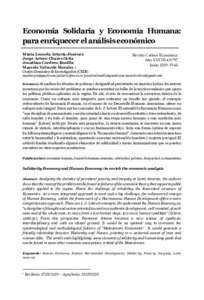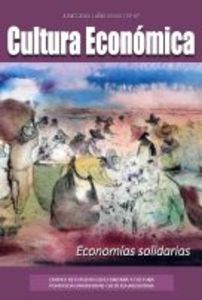Please use this identifier to cite or link to this item:
https://repositorio.uca.edu.ar/handle/123456789/9114| Título: | Economía Solidaria y Economía Humana : para enriquecer el análisis económico | Autor: | Artavia-Jiménez, María Leonela Chaves Ortiz, Jorge Arturo Cordero-Bonilla, Jonathan Valverde Morales, Marcelo |
Palabras clave: | ECONOMIA SOCIAL; DESARROLLO HUMANO; ANALISIS ECONOMICO; POBREZA; DESIGUALDAD; SOLIDARIDAD; ECONOMIA SOLIDARIA | Fecha de publicación: | 2019 | Editorial: | Pontificia Universidad Católica Argentina. Facultad de Ciencias Económicas. Centro de estudios en Economía y Cultura | Cita: | Artavia-Jiménez, M. L. et al. Economía Solidaria y Economía Human: para enriquecer el análisis económico. [en línea]. Revista Cultura Económica. 2019, 37 (97). Disponible en: https://repositorio.uca.edu.ar/handle/123456789/9114 | Resumen: | Resumen: : Al analizar las décadas de pobreza y desigualdad persistentes en América Latina, los autores muestran que las raíces del problema se pueden encontrar en fallas de la teoría económica que apoya las políticas públicas aplicadas en la región. De ahí, el reto de reconstruir la estructura teórica de la economía. Como un enfoque más integrado para enfrentar un desafío tan grande, el concepto redescubierto de Economía Humana, en el marco de un Desarrollo Humano Armonioso, ofrece un enfoque más integral. Estos son los conceptos de L. J. Lebret. Él entendió la Economía Humana como "una disciplina de pensamiento y acción orientada hacia un desarrollo auténtico, bien redondeado, de cada hombre y de todo el hombre, para pasar de una etapa menos humana a una condición más humana" (Lebret, 1966:32). Desde esta perspectiva, la ciencia económica se convierte en una nueva ciencia de síntesis, interdisciplinaria y con un fundamento ético. Sería una forma óptima de superar los fallos epistemológicos y metodológicos de la "Economía General". Generaría una relación amistosa entre la humanidad y la naturaleza, apuntando a ascenso universal de hombres y mujeres por igual. El artículo finaliza resaltando algunos elementos de solidaridad y metas humanizadoras que se pueden encontrar en otros aspectos económicos. Abstract: Analyzing the decades of persistent poverty and inequity in Latin America, the authors show that the roots of the problem can be found in failures of the economic theory that supports public policies applied in the region. Hence the challenge of rebuilding the theoretical structure of Economics. As a more integrated approach to meet such a big challenge, the rediscovered concept of Human Economy, within the framework of a Harmonious Human Development offers a more comprehensive approach. These are L. J. Lebret’s concepts. He understood the Human Economy as, “a discipline of thought and action oriented towards an authentic development, well rounded, of each man and of the whole man, to move from a less human stage, to a more human condition” (Lebret, 1966:32). From this perspective Economic Science becomes a new science of synthesis, interdisciplinary and with an ethical ground. It would be an optimal way to overcome the epistemological and methodological failures of “Mainstream Economics”. It would generate a friendly relatioship between Humanity and Nature, pointing to a universal ascent of men and women alike. The article ends highlighting some elements of solidarity and humanizing goals that can be found in some other economic conceptions, critical of the Mainstream. |
Cobertura Espacial: | Latinoamérica | URI: | https://repositorio.uca.edu.ar/handle/123456789/9114 | ISSN: | 1852-0588 1852-5342 (on line) |
Disciplina: | ECONOMIA | Derechos: | Acceso abierto | Fuente: | Revista Cultura Económica, Vol. XXXVII, n° 97, 2019 |
| Appears in Collections: | CECON - 2019 Año XXXVII nro. 97 |
Files in This Item:
| File | Description | Size | Format | |
|---|---|---|---|---|
| economia-solidaria-economia-humana.pdf | 470,6 kB | Adobe PDF |  View/Open | |
| culturaeconomica97.jpg | 8,65 kB | JPEG |  View/Open |
Page view(s)
605
checked on Jan 2, 2026
Download(s)
1,522
checked on Jan 2, 2026
Google ScholarTM
Check
This item is licensed under a Creative Commons License

